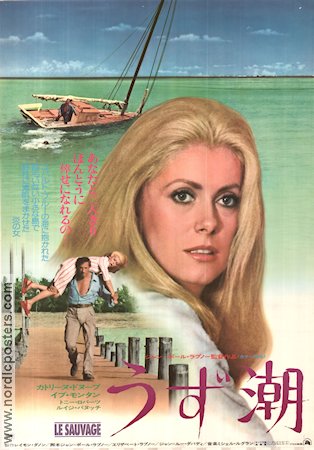"Le Sauvage" / "Call Me Savage", Dir: Jean-Paul Rappeneau, 1975
- Ravi Swami
- Nov 14, 2020
- 4 min read
At first glance, given the date of release, I would have dismissed "Le Sauvage" (Eng: "The Savage"), and variously released as "Call Me Savage" and "Lovers Like Us" as a slice of "Euro Fluff", something reinforced by the French language poster of its two leads, Yves Montand and Catherine Deneuve, that embodies a fantasy about European and specifically, French, men as being masculine and women as being the ultimate in femininity, which is somewhat diluted in the interesting Japanese poster that makes a feature of Deneuve's striking blonde good looks.
In common with a lot of the films I've watched during lockdown "Le Sauvage" suggests a more rounded picture of the films and acting range of two performers whose later work has been overshadowed by early successes - until later grittier roles, Montand was always a handsome leading man and Deneuve forever the "ingenue" of break-out roles in the films of Jacques Demy, of which I'm a huge fan as I've stated in previous blog posts.
By the late 70's however, as European cinema seemed to have lost its footing following the inventiveness of the 60's French New Wave and sought to emulate Hollywood - which seemed to be undergoing a period of reflection on a Golden Age of cinema as the future of big studio filmmaking hung in the balance - the films became straightforward entertainers, which in itself is no bad thing, but the type of weighty material that characterized the New Wave seems to have been left behind in favour of frothy romances and musicals.
I didn't really know what to expect of the film but the trailer suggested an interesting dimension to both the leads where they get to do a bit more and effectively shrug off the image forged in earlier films - Deneuve is feisty and independent, Montand, grizzly, unshaven for most of the film and definitely not the stereotypical suave lover as portrayed in his earlier films.
Deneuve plays a French woman who makes a bolt for freedom on the verge of marrying a rich Italian playboy whom she doesn't really love, along with his numerous relatives, and tries to make her way back to France from Italy, which involves initially hiring a taxi to take her to a hotel for the night to plan her escape. It is here that she first meets Montand, who is reluctantly drawn into the drama as her would-be husband tracks her down, determined to bring the marriage to a conclusion.
What ensues is a madcap chain of events that include a car chase, the theft of an original "Lautrec" by Deneuve from a former lover and a race to the airport with the help of Montand so that she can escape the clutches of the Italian playboy.
It's a lot of fun and the banter between Deneuve, a worldly and independent woman who has taken many lovers and husbands, and Montand as a world-weary man with a hidden past helps fills in the details behind their choices in the middle of a car chase, for example, so maintaining the momentum of the plot.
Montand for his part is making his way by boat to a tropical island hideout where he is the sole inhabitant after having successfully helped Deneuve to board a flight back to France but unbeknown to him, Deneuve has got there before him since she was unable to board the flight - in the meantime the Italian playboy has redoubled his efforts to track her down while Montand's estranged wife in New York - a co-director of an award winning scent manufacturer of which Montand is a key part, is doing the same.
So you get the picture - it's the kind of film that would be classified as a "Romp" or "Screwball Comedy", very much echoing a template established in an earlier era, with Montand playing a grizzled Spencer Tracy to Deneuve's Katherine Hepburn, or Cary Grant to Claudette Colbert - take your pick - characterized by sparky exchanges and snappy dialogue.
This template become clearer as Montand and Deneuve settle into an uneasy but passionate relationship on the island, with Deneuve as the disrupter of his island paradise.
You could flip the gender relationships and have the worldly male character happy to be open about his past against the suburban housewife trying to escape a life of boredom for adventure for the other template and in many ways the film echoes Jean Luc Godard's "Pierrot Le Fou" but gives black humour a wide berth in favour of a romantic comedy.
It would be fair to say that both leads are unrecognizable, in a sense, which adds to the feeling that you are discovering who they are beyond their earlier roles, in spite of an improbable plot and odd jumps in continuity and logic, eg Deneuve magically finds a bicycle on the island just when its required etc but these all fit the screwball template and so suddenly don't seem so out of place.
The film's score is by Michel Legrand, by then in his "Late Legrand" period of churning out film scores by the dozen, weaving in and out between his signature and instantly recognizable classically inspired orchestral work and more generic film underscoring.







Comments